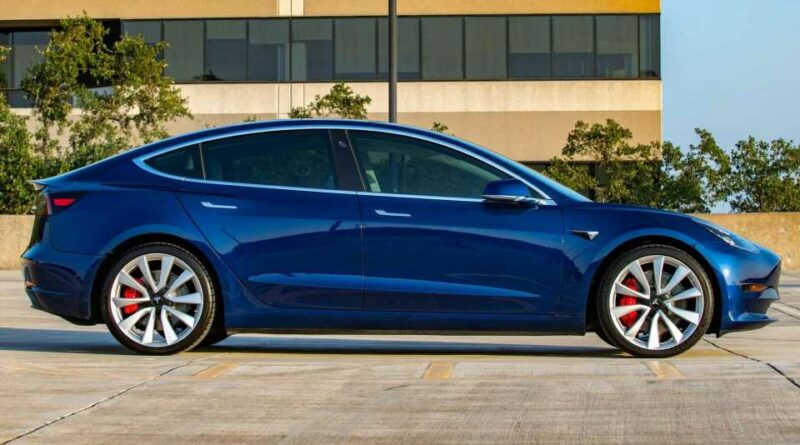The Tesla Model 3 Proved Me Wrong
Tesla Model 3 drama existed before the car even did. In 2014, we learned that Tesla CEO Elon Musk wanted to name it “Model E” so his car lineup—which consisted of the Model S and Model X at the time—could spell “SEX.” That idea died when Ford threatened legal action, saying “Model E” sounded too much like “Model T.” So “Model 3” it became, giving us “S3X” instead.
This Tesla Model 3 Performance is currently available for sale on Cars & Bids. Check it out and bid here.
Musk’s years-long goal was to make the Model 3 a $35,000 electric sedan: an entry-level Tesla that could rival gas-powered cars in price and beat them in efficiency. But it took a lot of fuss to get there: When the car debuted in 2017, Musk said Tesla financially couldn’t build the $35,000 version until production scaled up and cashflow came in from the more expensive models. The $35,000 version finally surfaced in 2019, but it was on sale for such a short period of time that when sales ended, no one knew if any $35,000 Model 3s were actually built. Amid all of that, Tesla’s working conditions and consistency of build quality were under fire.
https://www.youtube.com/embed/Kr_je-PlYcQ?si=6A_2dz36UismWKtQ
When I booked a 2019 Model 3 Performance to review recently, it was actually my first time in a Tesla. Tesla is notorious for seldom loaning cars to the press, and not every car reviewer gets to drive every car. We have to be at our desks to write the news stories you read every day, too.
I thought about how its history, and my lack of experience with the brand, would impact my opinion. I wasn’t worried about build quality or performance on this particular car; I’d seen photos beforehand, and “performance” is literally in the name. But I wondered how I’d feel about its ultra-minimalist interior, and whether I’d find Tesla’s Easter eggs—which range from fart noises to maps of Mars—fun or foolish. I thought about how nearly all of the Model 3’s controls are in a central infotainment touchscreen without backup buttons, and how screen-dependent cars haven’t existed long enough for us to know everything that could go wrong if the screen goes out.
But the specs have a way of easing some concerns. The 2019 Performance had 450 horsepower, 310 miles of range, all-wheel drive, a 0-to-60 time of 3.2 seconds, and Track Mode, which lets a driver adjust handling and disable stability control. Despite my doubts about the car, I loved it.
The car looked great; its big, rounded headlights and blank, grille-less face were innocent and inviting, like an old friend who’s been out of your life long enough to wipe the slate of any drama. Its interior was so airy and minimalist that it blended into its outdoor surroundings, prompting me as the driver to pay more attention to the world around me and less to the technology in front of me. The central touchscreen was intuitive, and I easily found both basic and obscure menu options without any googling or outside help.
Its instant torque and immediate acceleration gave me that classic EV feeling: basically, “I have a pit in my stomach from flooring this car.” Its regenerative braking—the process through which an EV slows down when you take your foot off the accelerator, feeding kinetic energy back to the battery to charge it—was so smooth that driving the car with only the accelerator pedal wasn’t just a task; I actively enjoyed it. Too often, regen settings in EVs are either too soft to drive with one pedal or so harsh that you have to adapt to their jerkiness while driving.
Then came the party tricks: the farts, maps of Mars, light shows, and more. I was skeptical at first, because Musk deeply wants to be funny, and there’s something unfunny about trying so hard. But I spent at least 10 minutes scrolling through every type of fart audio on the car’s “Emissions Testing” menu, from “Short Shorts Ripper” to “Neurastink.” I laughed the whole time.
I laughed even harder when I scheduled a light show and stepped out of the car, seeing it blare music and “dance” with its headlights, windows, and side mirrors for two minutes at a time. Everything about the car was fun, from driving it to laughing at its jokes.
The Model 3 became successful in spite of its failure to become the $35,000 electric car (for any meaningful amount of time, that is). It’s stylish, powerful, and efficient, and whether the headlines are good or bad, it’s hard to look away from.
I think that’s what charmed the world—me included.
Alanis King is a writer, editor, video presenter, and podcaster who loves cars, motorsports, cats, and chain restaurants. Her book about Formula One, “Racing with Rich Energy,” is out now.
This article was produced as part of our editorial partnership with Cars and Bids, the online auction marketplace to buy and sell modern enthusiast cars.
Source: Read Full Article




